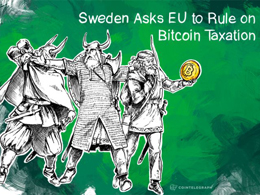
OECD calls out countries for their inconsistent rules on crypto taxation
The report suggests giving preferential tax treatment to PoS over PoW-based crypto assets. A study of cryptocurrency taxation regimes from around the world by the Organization for Economic Co-operation and Development, or OECD, found that global crypto taxation laws are highly inconsistent.Source: OECD Report.The way crypto assets are defined vary greatly by jurisdiction. Cryptocurrency is most commonly defined as a “financial instrument or asset”, followed by a “commodity or virtual commodity." In the U.S., the asset class remains mostly undefined for tax purposes.Source: OECD Report.The....
Related News
Crypto analytics firm Coincub has released crypto tax rankings, pointing out the worst and the best countries regarding crypto taxation. Global cryptocurrency taxation rules significantly vary among countries, and some jurisdictions have come up with extremely tough crypto tax policies for their residents.In a new study by crypto analytics firm Coincub, Belgium is referred to as the worst country in the world in terms of crypto taxation for residents. That is according to in-house rankings covering taxation aspects like taxes on crypto income or crypto capital gains.Belgium is known for....
It’s no secret that Swedish politics are becoming Bitcoin-centric. Now, Sweden’s government solicited the European Union to issue authoritative rules on the VAT (value-added tax) treatment to decentralized virtual currencies, such as Litecoin and Bitcoin. Sweden is looking for confirmation, now that the UK altered its position with regards to Bitcoin taxation. Earlier this month, Högsta förvaltningsdomstolen - the Supreme Administrative Court of Sweden - filed a special request asking for a preliminary ruling in front of the European Court of Justice. They wanted to know if Bitcoin....
According to the OECD, the crypto market posed a “significant risk” around tax transparency, claiming that any gains will eventually be lost without additional safeguards. The Organisation for Economic Cooperation and Development, or OECD, has suggested additional requirements on reporting crypto transactions and identifying users aimed at increasing transparency for global tax authorities. In a public consultation document released on Tuesday, the OECD opened for public comment a proposal that would require crypto service providers to better identify users and report on certain....
As the use of crypto assets increases, different jurisdictions create laws to govern their applications and controls. Some rules are connected to various aspects, with regulations and taxation taking significant roles. In a global analysis, cryptocurrency taxation is getting the high side. This is because most governments want to reap from the trading and transfers […]
The U. K. currently taxes gains made from Bitcoin, when Bitcoins are exchanged into fiat, as most other countries do. But 'Her Majesty's Revenue and Customs' may be changing the taxation rules regarding Bitcoin, Litecoin, and all other cryptocurrencies. Cryptocurrency is currently referred to as 'money vouchers', but the HMRC wants to change cryptocurrencies to be 'private currency', for taxation purposes. If Bitcoin remained as a 'money voucher', then a tax of 20% VAT will be charged on each and every Bitcoin transaction for U. K residents and businesses. Chaning Bitcoin to a private....





